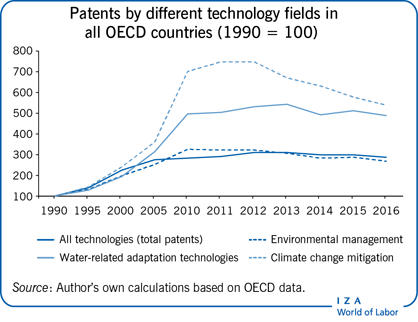Elevator pitch
New environmental technologies (environmental/eco-innovations) are often regarded as potential job creators—in addition to their positive effects on the environment. Environmental regulation may induce innovations that are accompanied by positive growth and employment effects. Recent empirical analyses show that the introduction of cleaner process innovations, rather than product-based ones, may also lead to higher employment. The rationale is that cleaner technologies lead to cost savings, which helps to improve firms’ competitiveness, thereby inducing positive effects on their market shares.

Key findings
Pros
Environmental regulation can help firms overcome informational, organizational, and coordination-related problems, leading to more eco-innovation activities.
Regulation-induced environmental process innovations can improve firms’ competitiveness and increase market shares, which may lead to more employment.
Skill-based analyses show that many green technologies require high qualifications thus leading to wage premiums compared to non-green jobs.
Environmental product innovations may lead to first-mover advantages for the respective firms.
Cons
Empirical evidence suggests that net employment effects of environmental and energy policies are small.
Regulation-induced eco-innovation may lead to a crowding out of other innovation activities, thus reducing employment in the affected fields.
Regulation measures are only successful for the realization of eco-innovations if they are well coordinated with other policies.
End-of-pipe technologies, such as additional filters or sewage works, may reduce employment due to higher production costs.